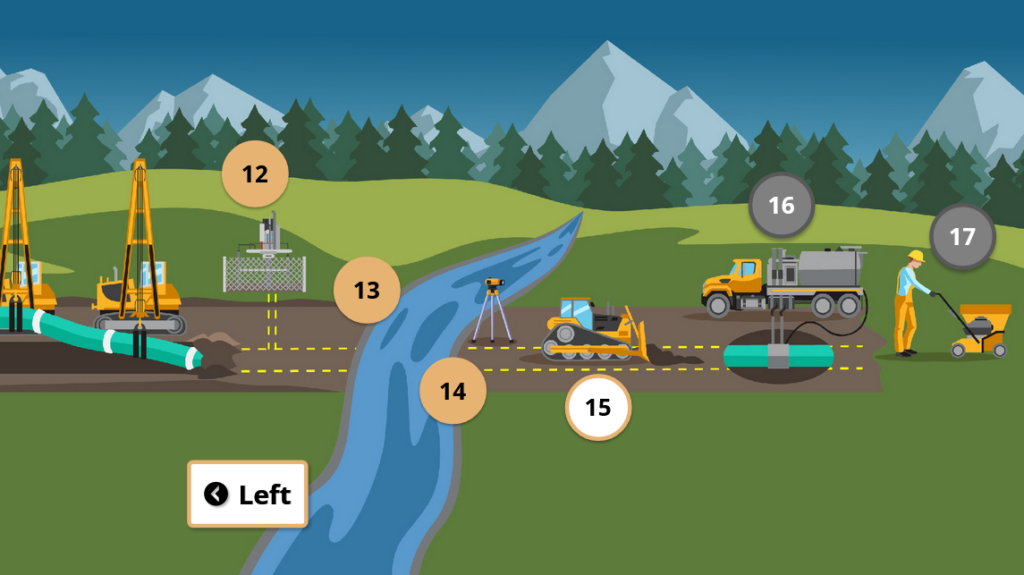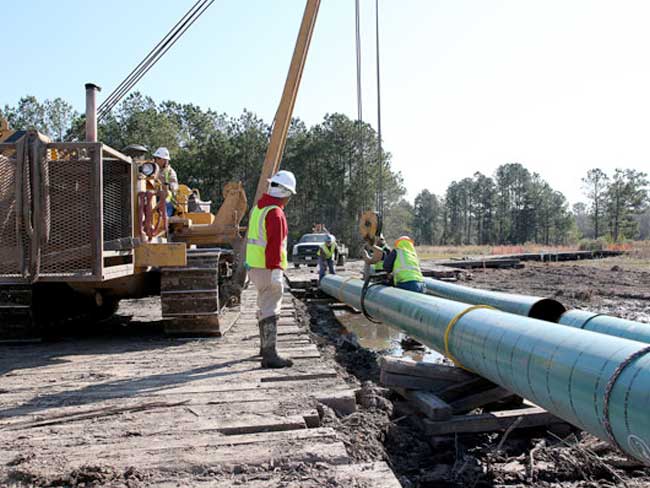Recognizing the Key Features of Pipeline Services and Their Impact on Performance
Pipeline solutions play an essential duty in different sectors, affecting functional efficiency substantially. Key features, such as sophisticated monitoring technologies and upkeep approaches, are crucial for decreasing downtime. In addition, regulatory conformity guarantees security and environmental defense. The interplay between layout, framework, and economic elements can make complex these procedures. Understanding exactly how these components effect overall effectiveness increases crucial questions concerning ideal techniques and future advancements in the area.
The Function of Modern Technology in Pipeline Tracking
As innovations in technology remain to evolve, the relevance of efficient pipeline surveillance has ended up being significantly apparent. Modern pipe systems depend on sophisticated monitoring devices that boost functional performance and safety. Technologies such as real-time data analytics, sensing units, and drones offer operators with immediate understandings right into pipe problems, enabling them to detect leakages, corrosion, and other prospective issues prior to they escalate right into significant issues.
The integration of Web of Things (IoT) gadgets has actually changed typical monitoring techniques, allowing for continual monitoring and automated coverage. This aggressive method not only lessens threats but additionally maximizes upkeep timetables and source appropriation. In addition, progressed software application systems facilitate data visualization and analysis, equipping decision-makers to respond swiftly to abnormalities. Jointly, these technological developments not just boost pipeline integrity yet additionally foster ecological stewardship by reducing the prospective influence of leakages and spills.
Maintenance Methods for Enhanced Performance
Efficient maintenance approaches are essential for maximizing pipe effectiveness. Executing anticipating upkeep methods, adhering to regular evaluation methods, and developing robust emergency action strategies can significantly boost operational dependability. These methods not just lessen downtime yet also add to the overall security and stability of pipeline systems.
Anticipating Maintenance Methods
Predictive upkeep strategies are increasingly recognized for their capability to improve operational performance in pipeline solutions. By leveraging information analytics and checking technologies, these methods enable operators to prepare for devices failures prior to they take place. This positive approach reduces unintended downtime, decreases upkeep costs, and extends the life expectancy of crucial properties. Sensors and IoT gadgets play an essential role in collecting real-time information, enabling the assessment of equipment health and performance fads. Artificial intelligence formulas analyze this information to determine patterns and forecast potential problems. Subsequently, pipeline operators can arrange upkeep tasks during non-peak times, enhancing source allowance and making certain continuous procedure. Ultimately, the adoption of predictive upkeep promotes a more trusted and efficient pipeline infrastructure.

Regular Assessment Protocols
Regular assessment procedures act as a keystone of upkeep techniques intended at enhancing efficiency in pipeline procedures - Midland oilfield pipeline services. These protocols involve organized assessments of pipeline stability, concentrating on finding potential problems before they rise. Regular inspections generally include aesthetic assessments, leakage discovery innovations, and pressure monitoring to ensure peak efficiency. By adhering to established routines, drivers can identify corrosion, material wear, or blockage, thereby decreasing downtime and repair work expenses. In addition, data collected during assessments can educate anticipating upkeep initiatives, permitting a positive technique to pipe management. Inevitably, routine inspections not just prolong the life expectancy of pipeline framework but likewise contribute to safer and more dependable transportation of resources, strengthening overall operational efficiency
Emergency Situation Feedback Preparation
Emergency action preparation is necessary for keeping performance in pipe procedures, guaranteeing that operators are prepared to address unanticipated events swiftly and effectively. A well-structured emergency situation action strategy consists of clear procedures, assigned duties, and interaction methods to mitigate risks connected with pipe failings. Regular drills and training enhance team preparedness and familiarize employees with emergency situation treatments. Additionally, having readily available resources, such as spill control tools and emergency call lists, can substantially lower reaction times. By incorporating real-time monitoring modern technologies, drivers can swiftly recognize and respond to concerns, minimizing ecological impact and functional downtime. Ultimately, a comprehensive emergency action plan not just safeguards possessions and employees but additionally reinforces the general efficiency of pipeline services.
Regulatory Compliance and Safety Specifications
Governing conformity and security standards play a necessary role in the pipeline solutions sector. Midland pipeline construction company. Complying with industry regulations guarantees that business execute effective security methods and take the chance of monitoring approaches. This dedication not only protects personnel and the atmosphere however additionally improves total functional performance
Compliance With Sector Regulations
Compliance with industry policies is vital for making sure the safety and efficiency of pipeline procedures. Regulatory structures, such as those established by the Environmental Security Firm (EPA) and the Pipeline and Hazardous Materials Safety Administration (PHMSA), established stringent standards that operators need to abide by. These guidelines cover various facets, consisting of pipe layout, building, upkeep, and surveillance, assuring that systems run safely and effectively. Non-compliance can bring about extreme fines, functional hold-ups, and environmental dangers. By sticking to these laws, pipe firms not just safeguard public security and the setting yet also enhance their operational performance. Inevitably, regulative compliance fosters count on amongst stakeholders, ensuring that pipeline services can operate perfectly in a competitive landscape while fulfilling lawful commitments.

Safety Protocol Application
Reliable safety protocol execution is an important element of pipeline procedures, very closely connected to governing conformity and safety requirements. Adhering to these procedures not just guarantees the security of workers yet also safeguards the setting and framework. A durable safety framework includes routine training, comprehensive examinations, and using suitable security tools. Organizations should continue to be attentive in upgrading their methods to reflect modifications in policies and technical developments. Compliance with established security criteria lessens the risk of mishaps and boosts operational efficiency. In addition, a culture of safety and security cultivates staff member involvement and responsibility, adding to total business success. Eventually, efficient safety method execution is vital in preserving the integrity of pipeline services and achieving long-term sustainability in operations.
Danger Administration Methods
Executing durable risk management methods is vital for assuring that pipeline operations comply with regulative needs and safety requirements. Organizations needs to recognize potential threats and analyze dangers connected with pipeline activities. This involves performing extensive assessments, utilizing sophisticated monitoring innovations, and preserving conformity with industry policies. Routine training for personnel on safety procedures boosts situational awareness and prepares groups to react efficiently to emergency situations. Additionally, creating backup strategies and carrying out drills can greatly alleviate dangers. Working together with regulative bodies makes certain alignment with advancing security standards. By prioritizing risk management, pipe solutions can improve operational efficiency while securing both the environment and public security. Ultimately, an aggressive strategy to take the chance of monitoring promotes a society of safety and security within the sector.
Pipeline Layout and Framework Considerations
Just how can the design and framework of pipelines affect total functional effectiveness? The setup of pipelines plays a vital role in determining their performance. Effective layout decreases rubbing losses, thus lowering energy intake throughout liquid transport. Factors such as size, material option, and layout directly effect flow rates and maintenance needs.
Additionally, strategic positioning of valves and keeping an eye on systems boosts functional control and safety and security. Creek Pipe local contractor. Facilities considerations, consisting of ease of access for repair and maintenance, considerably influence downtime and general performance
Moreover, incorporating advanced technology for real-time tracking promotes timely discovery of leakages or inefficiencies, guaranteeing swift actions to problems. The overall structural integrity, affected by material toughness and environmental elements, likewise shapes lasting functional success. Thoughtful design and durable infrastructure are important for optimizing pipe performance, inevitably adding to the integrity and profitability of pipeline solutions.
Ecological Influence and Sustainability Practices
While the demand for pipe solutions remains to expand, comprehending the ecological effect and embracing sustainability methods has become progressively necessary. The building and procedure of pipes can especially you could check here affect communities, wildlife habitats, and water resources. To alleviate these impacts, business are applying advanced technologies and methods intended at minimizing discharges, try this web-site avoiding spills, and lessening land interruption.
Sustainability initiatives usually consist of making use of eco-friendly materials, enhancing energy performance, and employing eco-friendly power resources to power procedures. In addition, companies are progressively carrying out comprehensive environmental analyses prior to task initiation, making sure conformity with regulations and stakeholder interaction.

Price Monitoring and Financial Consider Pipeline Services
As the pipeline sector grows, efficient price monitoring and recognizing economic elements come to be essential for maintaining competitiveness. Firms face different economic pressures, consisting of rising and fall product costs, labor expenses, and regulatory conformity charges. To browse these obstacles, pipe provider must adopt critical monetary planning and budgeting practices.
Investing in technology can improve operational effectiveness, eventually minimizing costs over time. Additionally, effective job management assurances that resources are designated efficiently, decreasing hold-ups and unforeseen costs.

Market conditions, such as need for energy and geopolitical factors, additionally affect economic stability. Firms should remain dexterous, adjusting their methods in reaction to these external elements.
Frequently Asked Concerns
What Are the Various Kinds Of Pipeline Provider Available?
Numerous sorts of pipe services include transportation, storage space, maintenance, evaluation, and repair. Each service plays a vital duty in making sure the smooth motion of products, boosting security, and lessening operational disturbances across different industries.
How Usually Should Pipeline Inspections Be Performed?
Pipeline evaluations ought to be carried out routinely, generally each to 3 years, depending on the kind and problem of the pipe. More constant inspections may be needed for older or high-risk pipes to guarantee security and stability.
What Are the Main Causes of Pipeline Failures?
The major sources of pipeline failures include deterioration, damaged building and construction, product flaws, outside damage, leaks, and operational errors. Each factor contributes substantially to prospective threats, highlighting the value of regular upkeep and tracking for safety.
Exactly How Can Firms Boost Pipeline Solution Reliability?
Companies can boost pipe solution integrity by implementing regular upkeep routines, using advanced tracking modern technologies, conducting complete examinations, investing in employee training, and taking on click here to read proactive risk monitoring strategies to prepare for and reduce potential failings.
What Duty Do Operators Play in Pipeline Solutions?
Operators play an essential role in pipeline solutions by making sure secure transportation, maintaining devices, keeping track of system integrity, coordinating maintenance, and replying to emergencies. Their competence directly affects operational effectiveness and reduces interruptions in solution distribution.